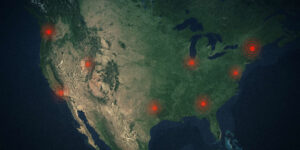US Supreme Court Refuses to Hear Prayer Case
A dispute over prayer in the name of Jesus has traveled all the way to US Supreme Court, but the nation’s most authoritative judges have decided not to get involved.
The U.S. Supreme Court on Tuesday declined to clear up conflicting positions among various appellate courts regarding the historical practice of offering prayers at public meetings according to the faith of the prayer-giver.
By declining to hear a case involving a Forsyth County, N.C., invocation policy, the court allowed a decision by the U.S. Court of Appeals for the 4th Circuit to stand that permits prayer but requires the county to aggressively police the words of those offering them. Alliance Defense Fund (ADF) attorneys represent the Forsyth County Board of Commissioners.
“America’s founders never shied away from referencing the God to whom they were praying when offering public invocations. The citizens of Forsyth County should have this same opportunity. No federal court has ruled that prayers cannot be offered before public meetings,” says David Cortman, ADF senior counsel.
“The Supreme Court has simply missed an opportunity to clear up the differing opinions among the various circuits about the content of the prayers. This means that, for the time being, the standard for prayer policies in the 4th Circuit will be different from the standard held by the rest of the country. ADF will continue to litigate in favor of the historical standard until the Supreme Court eventually hears a case that will clear up the confusion.”
In March 2007, the American Civil Liberties Union (ACLU) and Americans United for Separation of Church and State (AU) sued the Forsyth County Commission on behalf of three individuals because they claimed to be offended by simply hearing the invited speakers deliver prayers that included a reference to Jesus Christ or any other named deity. Specifically, they demanded the county discourage or prohibit invited speakers “from including references to Jesus Christ, or any other sectarian deity, as part of their prayers.”
“Public officials shouldn’t be coerced into censoring the prayers of those invited to offer them just because the ACLU and AU don’t like people praying according to their own consciences,” says ADF-allied attorney and co-counsel Mike Johnson, who argued the case before the 4th Circuit and is currently dean of Louisiana College’s Pressler School of Law.
In October, ADF attorneys asked the High Court to review the 4th Circuit’s decision, which upheld a district court’s ban on prayers by invited clergy that may mention a particular deity prior to public meetings. The decision is in conflict with the history of invocations in America and other recent federal court decisions. Each of the five other federal courts to review similar policies since 2008 has found them to be constitutional.
Two judges on the three-judge panel for the 4th Circuit upheld the district court’s ruling against the county commission’s policy. The third judge on the panel, Circuit Judge Paul V. Niemeyer, strongly dissented from the ruling, writing that “the majority has dared to step in and regulate the language of prayer.”




























































